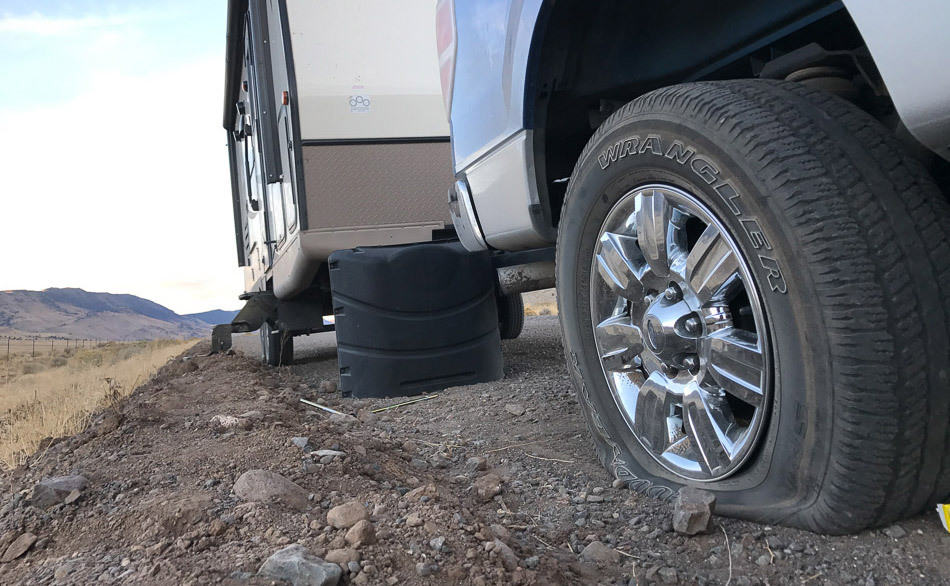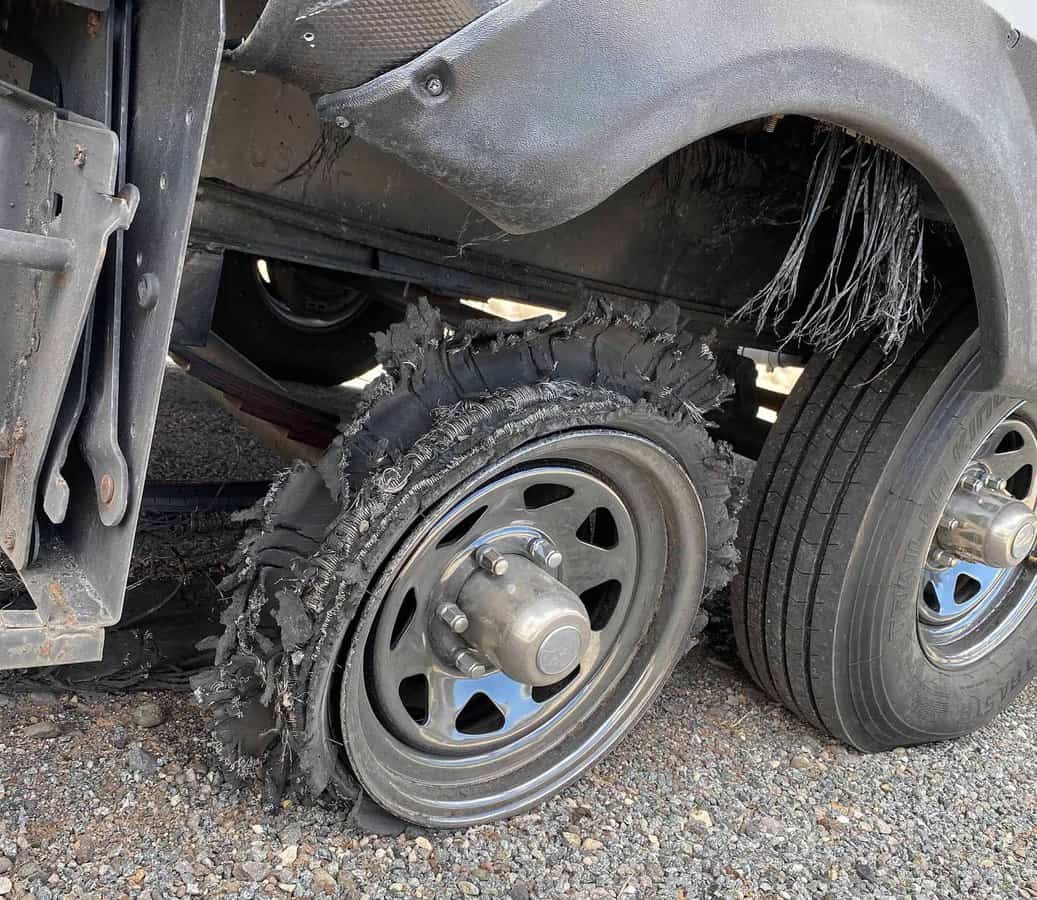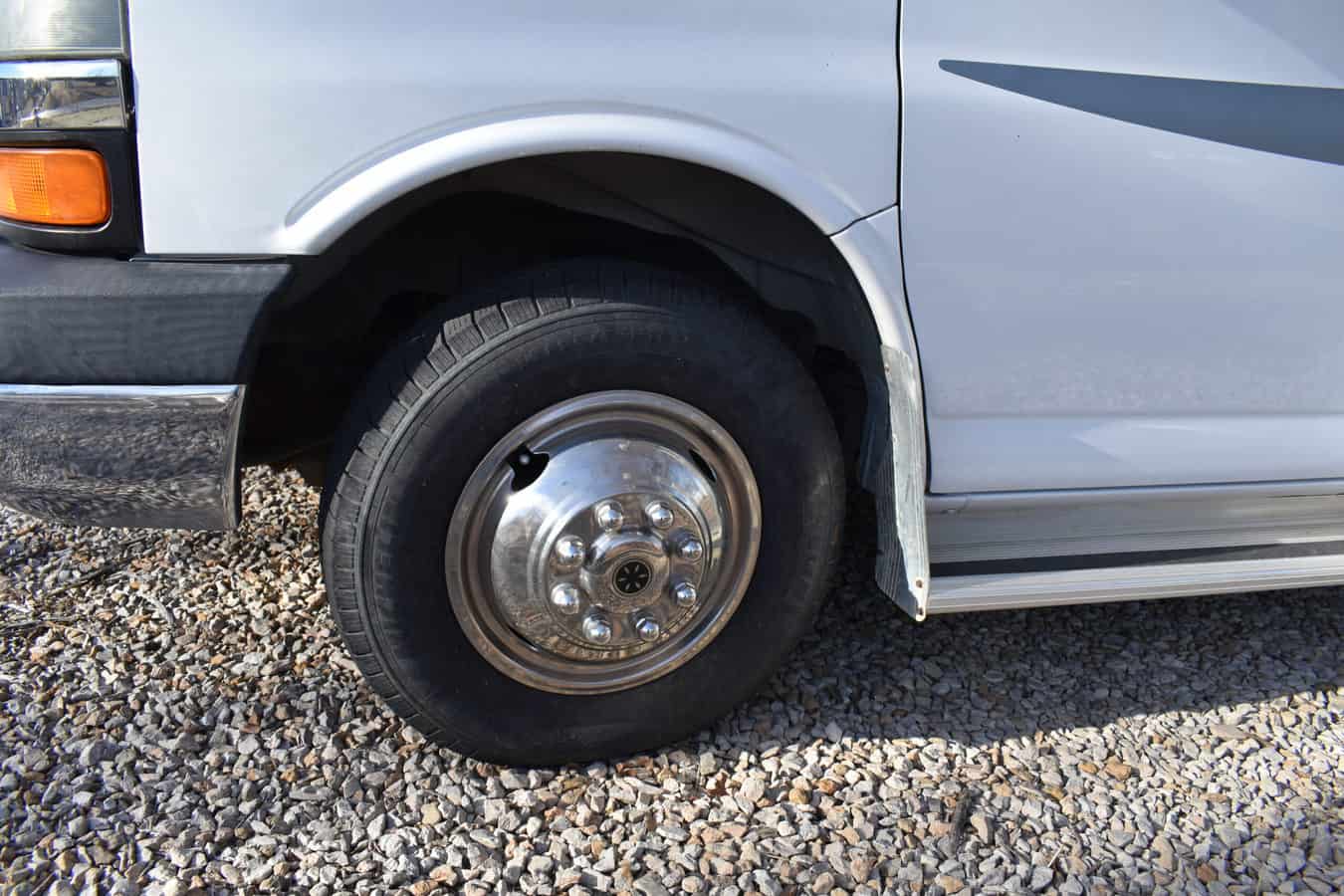
Trailer tires last long enough to enjoy a lot of great RV trips. On the outside, they might look fine. But inside could be another story. Here’s what you’ll learn about when to replace RV trailer tires:
- How driving mileage ages trailer tires
- Why trailers that sit too long need new tires
- The easy way to know your trailer tire age
- Why trailer tire inflation is critical for safety
- How to choose the right trailer tire
These Two Things Determine How Long RV Trailer Tires
I found with tires, there are two areas to be concerned about: tread and aging tires.
- If you drive about 10,000 to 15,000 miles a year, the treads will wear out before the tires do in less than five years.
- But if you drive 5,000 or less a year, your concern would be about the aging tires themselves, rather than the tread.
Aging tires also have obvious sidewall cracks. But cracks don’t always appear on the sidewalls. Some might be inside your tire. Internal cracks lead to separation of the steel belts. This can cause you to lose control of your trailer on the road.
Regardless of the mileage, if a trailer sits for four years without moving, the tires are still deteriorating. All RV trailer tires should be replaced within five years.
Check your Trailer Tire Age
You know RV tires need replacing about every four or five years. But how do you know how long the tires were at the tire shop before you purchased them? There’s an easy way to find out.
All tire manufacturers stamp production dates onto the sidewalls. To find out how old your tires:
- Look for the DOT letters on all your trailer tires, including the spare.
- Skip the next code of four letters/numbers
- The next code is the date code.
- Write the date code down, then enter it on CheckTire. The manufacture will appear, and this let you know the actual age of your tires.
Prevent Trailer Tire Deterioration
Heat and improper maintenance cause deterioration of tires. So does ultraviolet light, which causes chemical changes in the rubber. And just as hoses and belts in cars can dry rot, dry rot can set in if the tires are exposed to extreme heat and low inflation. Lack of use accelerates the process. Discoloration and cracks in the sidewalls of a tire can be a clue to dry rot.
How to Slow RV Tire Aging
- Over-washing can remove chemicals designed to slow the aging process.
- Don’t allow your tires to sit unused.
- Remember your spare trailer tire is subject dry rot. Keep it covered to reduce ultraviolet light exposure.
- Don’t use cheap tire cleaning products. Many contain petrochemicals and silicone which remove chemicals the factory puts into place to slow aging. Water-based tire products are a better choice for your tires.
Why PSI is so Important for RV Tires
Trailer tires are made with a thicker sidewall to handle weight, they require the right amount of inflation. If RV tires are under-inflated, it causes more heat while driving, and the tire could fail.
Proper RV trailer tire inflation is a must. Using the right amount of PSI prevents RV trailer tire blowouts, increases fuel efficiency, and slows the tire aging process. Take that pressure gauge out and put it to good use before each trip.
Your RV trailer tire maximum PSI is located on tire sidewalls.
RV tire pressure monitoring systems are an excellent investment. They give warnings if one of your tires becomes underinflated. This increases your safety and reduces risk of tire failure while moving. Many insurance carriers offer discounts for TPMS owners.
Tires can also be kept in better condition by winterizing them along with the rest of the camper.
- Inflate the tire to the proper pressure and cover to keep out ultraviolet light.
- If parking on asphalt, place a piece of wood between your tires and the ground. Asphalt contains harmful petrochemicals and frozen ground, in general, is harmful to tires.
- Don’t allow the tires to overlap the ends of the wood pieces. It might cause damage to the interior of the tire.
Help your RV trailer tires last longer by keeping them balanced. Unbalanced RV tires develop wear spots on the sides of the tire treads. These spots can be harder to see on the inner side of the tire.
How to Choose the Best Trailer Tire
Passenger car tires are not built for campers with the heavier weight load. There are differences between passenger car tires, light truck tires, and special trailer tires. Light truck tires are more flexible and less durable for an RV trailer. This can lead to more chances of a blow-out or swaying.
Using the right tire can help avoid trailer sway and tire blow-outs. Trailer tires are designed with larger polyester cords and stiffer sidewalls for carrying heavier weight loads. Special trailer tires should never be used for drive or steering axles, but for trailer position axles only.
- Double-check your trailer tires. Look for the letters ST on the sidewalls.
If you see the letters LT, you have light truck tires, which need to be changed. Check and be sure that you don’t have an ST tire on the drive or steering axles. As I mentioned before, weight load is important. Since I load my camper with water, fuel, and food, how much weight can I safely put on my tires?
Why the Correct Weight Load for Trailer Tires Matters
If you want your tires last as long as safely possible, don’t overload them. Overloading can also cause a tire blowout. Check the sidewall for the letter showing the load range. This can be a letter from A through N. Charts at tire shops will show what weight that letter load range can be. Note the letter on the sidewall of your trailer tire when you get your trailer. Never switch to a lower load-bearing tire.
Conclusion
Whether you are a weekend warrior or a full-time RVer, keep an eye on your wheels, your load range, and your PSI. Stay on top of all three and your trailer tires can carry you to many great adventures.




One thing on tires that I found out the hard way – CHECK THE BUILD DATE of the tires. ST Tires wear from the inside out, making it hard to really tell their condition. Our 2018 Coachman was purchased new in 2019, as a dealer leftover. Being new to the RV, we did not know to check the manufacture date on the tires. I have always checked the tire pressure at least twice on each trip. Well, yes, we still had a blowout, which damaged our trailer. Dealer is working to resolve the damage, but, I contacted my trusted tire center to see if I could understand better what might have caused this. They told me that the code date or build date of the tires on my rig is 2015, or, the 20th week of 2015. That means that when I took delivery of the rig, these tires were already 4 years old. The tire center told me, that the average life of an ST tire is about 5 years, so, really, the blowout was going to happen sooner or later. Please, always check the age of your tires! Especially if you are new to RVing.
Dear Manager,
How are you recently?
This is Lillian from Taizhou Bao Lunyou Machine Co.,Ltd.
Our company is specialized in producing various sizes atv wheels, cart wheels, trailer wheels, passenger car wheels and 4×4 off-road wheels.
Rim sizes from 4inch to 18inch;
Rim Finish can be White/Black/Silver/Galvanized/Chrome;
Package: Carton Box/ Pallet;
Our factory can also make rim and tire assembly for your convenience. Do you need any tires?
Welcome to inquire me if you have any order.
Best Regards,
Lillian Lee
I need wheels for a 1966 dodge motor home. 16 in. 6 bolt hole. One ton. Thanks John